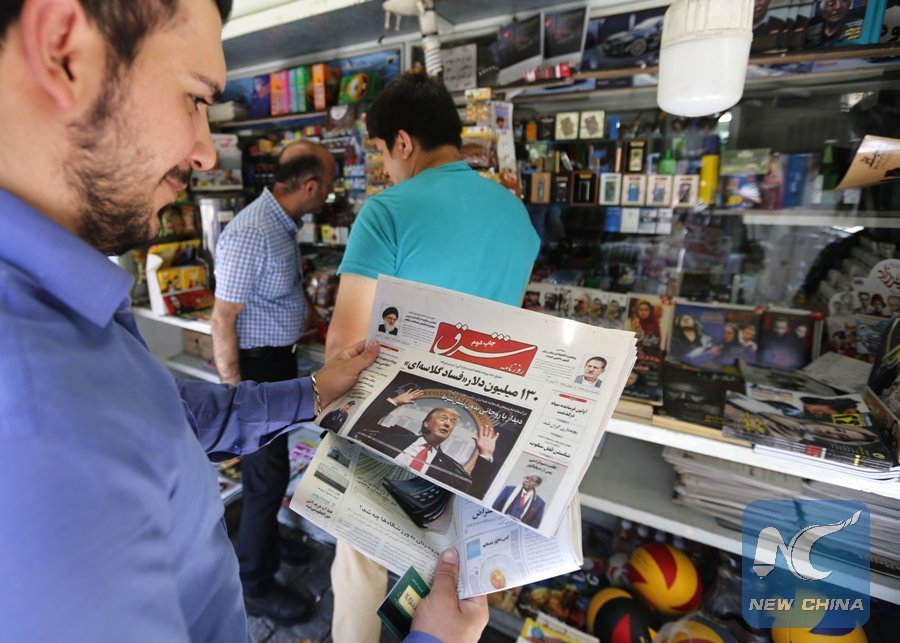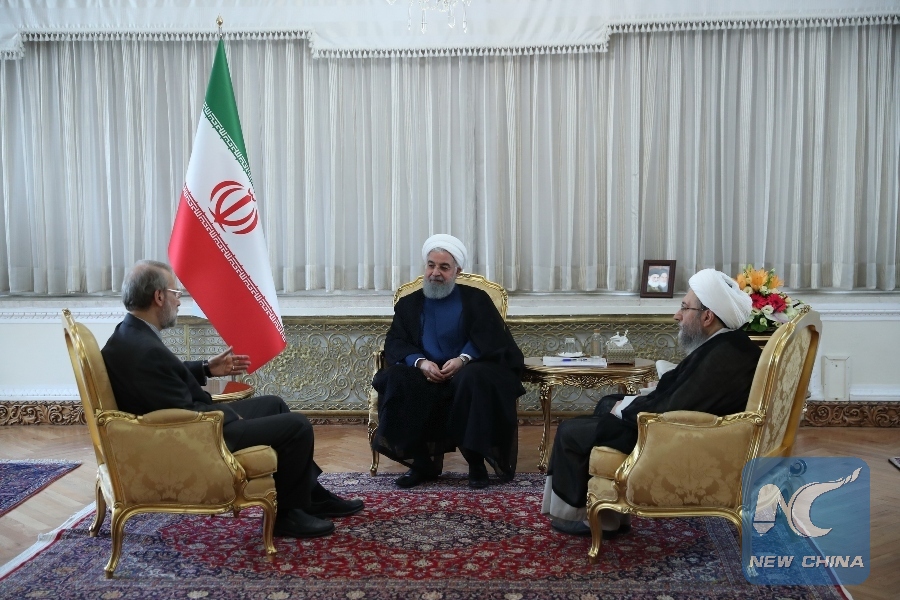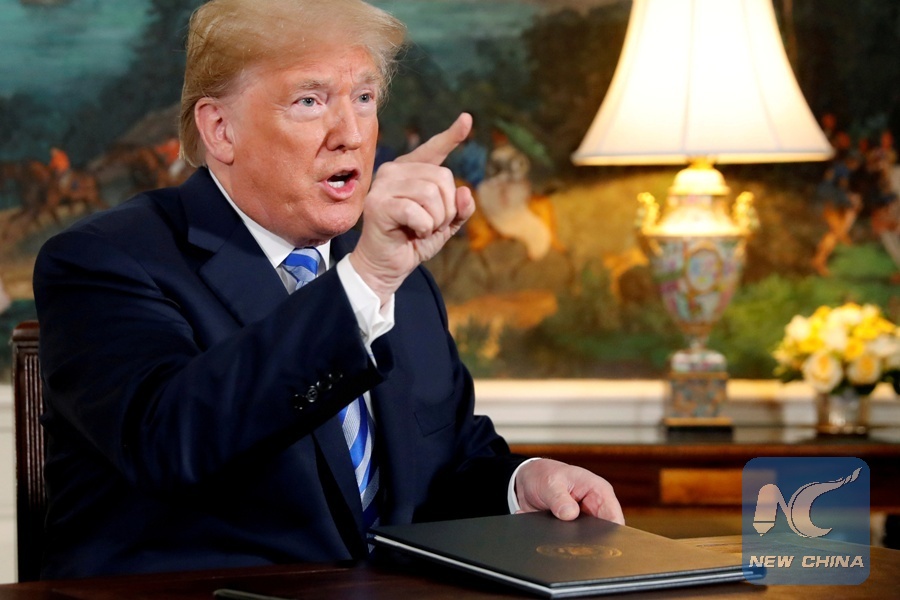
A man takes a glance at a newspaper with a picture of U.S. president Donald Trump on the front page, in the capital Tehran on July 31, 2018. (Xinhua/AFP PHOTO)
WASHINGTON, Aug. 6 (Xinhua) -- As Washington is set to reimpose formal sanctions on Iran on Monday, the odds are high that Washington's maximum pressure campaign pull itself further away from its policy goals, U.S. experts said lately.
Following U.S. President Donald Trump's decision to stop the historic Iran nuclear pact on May 8, the United States vowed to re-impose sanctions lifted under the accord against Iran and inflict punitive actions, such as secondary sanctions on nations that have business links with Tehran.
U.S.-Iranian relations have been on the fritz ever since the Trump administration abandoned the Iran nuclear deal, delegitimized its government, vowed to re-impose sanctions and pressed other nations to isolate Iran.

A handout picture provided by the Iranian presidency shows Iranian judiciary chief Sadegh Larijani (R), Iranian president Hassan Rouhani (C) and parliament speaker Ali Larijani (L) during a a meeting in Tehran on July 14, 2018. (Xinhua/AFP PHOTO)
MAXIMUM PRESSURE AMID MILITARY TENSIONS
Brian Hook, director of policy planning for U.S. State Department, said on July 2 that U.S. sanctions on Iran will snap back in Aug. 6 and Nov. 4.
"The first part of our sanctions ... will include targeting Iran's automotive sector, trade in gold, and other key metals," he said, adding the remaining sanctions will "target Iran's energy sector and petroleum-related transactions, and transactions with the Central Bank of Iran."
Moreover, Washington focuses on "getting as many countries importing Iranian crude down to zero as soon as possible" to reduce Iran's revenue from crude oil sales.
The key part of U.S. strategy on Iran is "a campaign of maximum economic and diplomatic pressure," Hook noted, adding that over 50 international firms have announced their intent to leave the Iranian energy and financial markets.
The U.S. Departments of State and Treasury also sent senior officials to visit Europe, East Asia, the Gulf and Europe to explain the sanctions and "warn governments and the private sector of the risks of continuing to do business with Iran."
However, as part of his unpredictable diplomacy tilt, Trump surprised many by saying on July 30 that he is ready to meet with Iranian President Hassan Rouhani with "no preconditions" at "anytime they want to."
The U.S. National Security Council said later that Trump's offer does not mean Washington will lift its sanctions on Iran.
Tehran responded that "hostile policies of the United States ... and economic pressures on Iran leave no chance for talks," adding that "the United States has proved that it is unreliable, so engagement and dialogue with the current U.S. government is impossible."
Mohammad Ali Jafari, chief commander of Iran's Islamic Revolution Guards Corps, also said this month that he will never allow Tehran to hold talks with Washington; rather, Iran will stay on the path of resistance against its pressures.
Besides threatening to block the Hormuz Strait, a key water lane to ship out Gulf oil, Iran has reportedly conducted military exercises in the region since August.
Up till now, U.S. sanction threats on other countries that have business engagement with Iran have been rejected by India and Turkey. Brussels also decided to resume a counter-sanction regulation that will take effect before Aug. 6 that enable European nations not to succumb to U.S. sanctions.

FILE PHOTO: U.S. President Donald Trump speaks to reporters after signing a proclamation declaring his intention to withdraw from the JCPOA Iran nuclear agreement in the Diplomatic Room at the White House in Washington, U.S. May 8, 2018. (Xinhua/REUTERS)
SANCTIONS "DAMAGING" TO IRAN, COUNTERPRODUCTIVE TO U.S. GOALS
U.S. experts said the U.S. sanctions to come will impose "damaging" effects on Iran's economy and the people's livelihood; However, the results of U.S. actions will also undermine its own policy goals in the end.
Wayne White, former deputy director of the Middle East Intelligence Office of the State Department, told Xinhua that the sanctions on Iran's precious metal trade are aimed at the Tehran's tendency to buy gold as a hedge against its volatile currency which has been falling dramatically this year and driving up gold prices in the country.
Targeting the automobile market in Iran is damaging, White said, adding: "Since the signing of the JCPOA in 2015, the number of European auto companies moving into the lucrative Iranian auto market for sales or licensed production has spiked. Few know that Iran is the world's 12th largest auto producer ... Already, some European companies have put their plans on ice."
David Pollock, a senior fellow at the Washington Institute for Near East Policy, told Xinhua that the U.S. plan to separate sanctions into two phases aims to do them "in an incremental" and "step-by-step" manner, so it is not too sudden for and to give fair warning to related-nations, especially non-Iranian companies and governments which could face secondary sanctions.
"We're starting something relatively limited, and it's a signal in my opinion to get ready for the really big sanctions by November," he added.
However, White argued that although these sanctions will hurt Iran, they probably won't seriously destabilize it, let alone achieve regime change.
Besides, "sanctions will not cause Tehran to re-negotiate the Iran deal in Washington's favor. And if the Trump administration also levees sanctions on the Europeans for commercial activity in Iran, the Europeans could retaliate by toughening their positions on pending U.S.-EU talks. Meanwhile, U.S.-Iranian relations, always troubled, will be even more down in the dumps," he noted.
Experts also said that despite Iranians' anger over the government's economic mismanagement and corruption, U.S. sanctions would increase the overall anti-American sentiment in the country, making it even harder for Washington to achieve its goals regarding Iran.
Richard Baffa, a senior international and defense policy researcher at the RAND Corporation, warned that "if draconian sanctions are eventually re-imposed and if European governments do not successfully push back against such measures, it is possible Iran would then move to formally withdraw from the agreement and re-start its nuclear program."
A broader collapse of the agreement along with the U.S. re-imposition of harsh sanctions could lead to an Iranian departure from the deal along with a move to re-start its nuclear program, sparking "profound, destabilizing implications for the region," he said.
"In the near term, the Israelis will be alarmed and the military option almost certainly will be back on the table. Over the mid-term, the Saudis and others might pursue a weapon of their own," Baffa noted.
U.S. CHANCE FOR ENGAGING IRAN SLIMMER
There is momentum for both sides to engage. In the eyes of White, some Iranians still wish their nation to talk with Trump, "not because they trust him or expect much, but because they believe Iran has nothing to lose by doing so."
On the U.S. side, Pollock pointed out that there might be some flexibility in U.S. desires laid out very clearly in the list of 12 demands and its conditions for better relations earlier outlined by U.S. Secretary of State Mike Pompeo, and that Trump himself has extended wish to sit down with Iranian leaders with no pre-conditions.
However, an article by Reuters noted that Washington "has not clearly defined its desired end state for its Iran policy or outlined a face-saving path for Iran's rulers that would allow them to deescalate steadily mounting tensions between Washington and Tehran."
"That has raised concerns of an increasing risk of confrontation," it said, explaining that the U.S. "bad faith" decision to leave the Iran nuke deal, its harsh rhetoric against Tehran, and its reported bid to forge an "Arab NATO" of Sunni Muslim allies against Shi'ite Iran have "fueled speculation that Trump is seeking to promote enough unrest to potentially unseat Iran's rulers," and would "inadvertently trigger a conflict that could draw in the United States."
The situation in Tehran is not any better either. Trita Parsi, president emeritus of the National Iranian American Council, wrote lately that "to Tehran, concessions that would make America - and Trump - look good and give the impression of Iran submitting itself to America, even if only symbolically, are the costliest."
He explained that Iran has long insisted that it would only negotiate with the United States as an equal and with "mutual respect," and "a central objective has been to only engage in talks that restore Iran's dignity and force the US to treat Iran as an equal."
The "historic and political sensitivities may make a Trump-Rouhani handshake quite unlikely in the months and years ahead," Parsi added.
Dalia Dassa Kaye, director of the Center for Middle East Public Policy at the RAND Corporation, told Xinhua that "it's certainly unrealistic to think that with the U.S. in violation of the deal rather than Iran, the United States will be able to create a even stronger multilateral sanctions regimes on Iran than existed before the JCPOA.
"Not only is the U.S. isolated but it's not clear how the new approach will actually produce different Iranian behavior or a better nuclear deal," Kaye noted. (Matthew Rusling from Washington also contributed to the story.)

